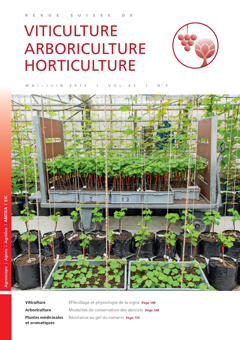
Issue 3 - May - June 2013
Abstract in open access
Leaf removal is a common practice in northern vineyards. This review of literature aims at gathering the knowledge about this cultivation technique. The different defoliation periods are reviewed. Risks (flower abortion, sun burn) and advantages (rot control) of this process are also presented giving a particular attention to the compensatory physiological mechanisms following vine defoliation. Earlier is defoliation realized, more significant will be the consequences on the vine physiology. The link between defoliation and must quality is discussed. There is an actual revival of interest in early defoliation before berry set as a way to increase the quality potential of wines in terms of aromas and polyphenols.
Keywords: grapevine, defoliation, physiology, wine quality
E-Mail: thibaut.verdenal@agroscope.admin.ch
Adress: Agroscope, 1009 Pully
Abstract in open access
Two trials on the association of the cv. Gamaret with several rootstocks were conducted in the vineyards of Ticino with the aim of improving its vegetative behavior and productivity. Under less fertile soils conditions, more vigorous rootstocks (5 BB or SO4) significantly improved the homogeneity of growth and vigour of the cultivar and could be recommended instead of the traditional 3309 C. But on fertile soils where 3309 C gives a sufficient vigor, those rootstocks are not recommended because they enhance the risk of higher flower abortion and poor fruit set during the years with unfavorable weather during the flowering period.
Keywords: grapevine, Gamaret, rootstock, vigour, mineral nutrition, wine quality
E-Mail: jean-laurent.spring@agroscope.admin.ch
Adress: Agroscope, 1009 Pully
Abstract in open access
Apricots ripening evolves quickly after picking. Various techniques can be used to maintain fruit quality, such as temperature reduction and modified atmosphere. In this study, the influence of these two techniques was tested on three apricot varieties (Orangered®, Bergarouge® and Goldrich) over a four years period. The results show that storage under modified atmosphere using Xtend® packaging allows reducing firmness and weight losses. However, internal browning possibly caused by a too high carbon dioxid (CO2) concentration occurred on fruit stored in these packaging. Storage at 1 °C reduces the development of fungal diseases and prevents firmness loss compared to storage at 8 °C. Sugar content, acidity and color were not significantly influenced by the tested techniques.
Keywords: storage, modified atmosphere, temperature, apricot, quality
E-Mail: severine.gabioud@agroscope.admin.ch
Adress: Agroscope, 1964 Conthey
Abstract in open access
In Switzerland, the commercial cultivation of rosemary for the production of fresh herbs, spices or essential oil is marginal, mainly because of the very high risk of losses due to winter frost. Located in the south of the country, only the canton of Ticino can provide prospects of success. During the two winters from 2011 to 2013, five genotypes known for their hardiness were tested in Ticino and in Valais. All the evaluated clones suffered frost damage. However, the North American genotype ‘Arp’ clearly distinguished from the others by its better frost resistance and its ability to survive in the field at temperatures reaching –10 °C. It is characterized by an erect growth, a high essential oil production potential and a 1,8-cineole-camphor aromatic profile. In Switzerland, the protection of rosemary fields with a geotextile veil or under a plastic tunnel remains highly recommended, even in southern areas.
Keywords: rosemary, genotype, frost damage, essential oil, yield, Switzerland
E-Mail: claude-alain.carron@agroscope.admin.ch
Adress: Agroscope, 1964 Conthey
Abstract in open access
The current certification of fruit trees in Switzerland is not widespread, although only a certification scheme guarantees virus-free, healthy young fruit trees. The certification of fruit trees is voluntary. Whether certified fruit trees are offered by nurseries depends on the demand by fruit growers. Viruses and phytoplasmas can cause economic damage, which may vary from year to year, depending on species and fruit variety. Potential yield losses due to frequently occurring viruses and phytoplasmas in apple and pear plants were estimated through ARBOKOST calculation model developed by Agroscope. In a Golden Delicious orchard, a virus attack with slight yield loss of 15 % would cause a loss in yield of 50 000 CHF/ha in the 15th year, according to ARBOKOST. In an orchard of cv. Conférence with an attack of pear stony pit virus, the loss in yield reaches 90 000 CHF/ha in the 20th year. Yield losses by viruses and phytoplasmas could be prevented in the future if fruit growers actively ask for and acquire only certified fruit trees.
Keywords: certification, fruit trees, Switzerland, yield loss, virus, phytoplasma.
E-Mail: markus.buenter@agroscope.admin.ch
Adress: Agroscope, 8820 Wädenswil

 Download of full issue
Download of full issue
 Download article
Download article